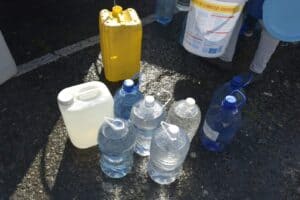Opposition parties are likely to use the poor state of water quality as a major campaign issue against the ANC in the 2024 elections.

With nearly half the water supplied by municipalities being unsafe for human consumption due to failing quality tests, water is expected to one of the sticks opposition parties will use to hammer the ANC ahead of the 2024 polls, say political experts.
Deputy President Paul Mashatile on Tuesday highlighted the ANC’s achievements during his first annual address to the National Council of Provinces.
ALSO READ: Decline in water services, but minister warns of exaggerating ‘crisis’
“Our journey as a leading political party started back in 1994. As an ANC-led administration, we can unequivocally state that South Africa is in a much better place now than it was 29 years ago,” he said.
Referring to the 2022 Census Report, Mashatile said there had been significant inroads into undoing the legacy of decades of apartheid spatial planning and its consequences on the lives and livelihoods of South Africans.
“In 1994, only six out of 10 South Africans had access to clean drinking water. That figure has increased to nearly nine out of 10… Today, two out of three South Africans have access to flushed toilets and eight out of 10 have improved sanitary facilities.
ALSO READ: Linguistic error: Panyaza Lesufi ‘understands very well’ how his promises are believed
“These measures have enhanced millions of South Africans’ quality of life and dignity.”
After the release this week of the full Blue and No Drop reports, and the Green Drop progress assessment report, the department of water and sanitation (DWS) yesterday warned that noncompliance letters would be issued to municipalities with systems scoring poorly or badly in terms of drinking water quality.
“Failure to respond to a noncompliance letter, is a criminal offence,” DWS spokesperson Wisane Mavasa said.
“There is currently no penalty in our legislation for not achieving or maintaining the norms and standards. This is being corrected with the new [National Water] Amendment Bill that is currently out for public comment.”
ALSO READ: ‘We have not deviated from Mandela’s values,’ insists troubled ANC
In its assessment, the DWS report found:
• While 54% of water supply systems achieved excellent or good microbiological water quality compliance, 46% achieved poor or bad microbiological water quality compliance.
• The Northern Cape has the highest percentage of drinking water systems with poor or critical performance (87%), which has deteriorated from 48% in 2014.
• The percentage of drinking water systems with poor or critical performance in the Free State has also deteriorated markedly between 2014 (31%) and 2023 (59%).
• Based on water quality tests carried out by municipalities during the 2021-22 financial year, national nonrevenue water increased from 37% in 2014 to 47% in 2023, caused by pipe leaks, poorly functioning or nonexistent water meters, illegal connections and poor billing.
• Sixty-four percent of wastewater treatment works are at high or critical risk of discharging partially treated or untreated water into rivers and the environment.
READ ALSO: Water crisis: Municipalities up the creek without a paddle
Environmental organisation WaterCan spokesperson Dr Ferrial Adam said: “There is an overall deterioration in meeting standards, with treatment works failing and 47.4% of our water lost or unaccounted for.
“If 46% of municipalities are not complying with drinking water standards, that means you should not drink the water from those systems without boiling it.
“Why have we not seen more notices warning consumers to boil water before drinking? “Are they not letting people know that the water is contaminated?
READ ALSO: Water shortage is the next disaster
“Surely that is a crime?” Independent political analyst Sandile Swana said areas like the Makana municipality in the Eastern Cape – hard hit by severe water shortages – were likely to reflect their unhappiness through the ballot box.
He said: “As we speak, it has become a norm for people to receive erratic water services, with continuing political turmoil having spilled into the open in Makana, where residents and NGOs [nongovernmental organisations] have asked the ANC for answers.
“The issue has been that of drinking water and removal of sewage and wastewater out of different areas – a big issue. “The outbreak of cholera is a clear sign that in several areas, 60% of municipalities, there is now a mixing of waste water and drinking water.
“Since the ANC Polokwane conference, the declining quality of services in South Africa has been associated with the decline in ANC votes.
ALSO READ: Will we have water for Christmas? Rand Water’s plan to keep the taps flowing this festive season
“The ANC has been losing votes because services, which include water and sanitation, have been declining – worse now.”
University of Pretoria politics lecturer Roland Henwood said: “Service delivery has been a general problem for a long time.
“Depending on the nature and severity of water problems, it may become a more important issue in 2024.
“The compounding effect of electricity, water and other issues may be more of a factor.”






